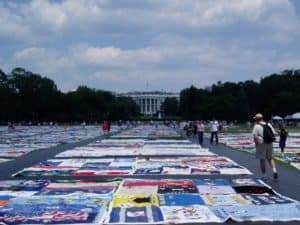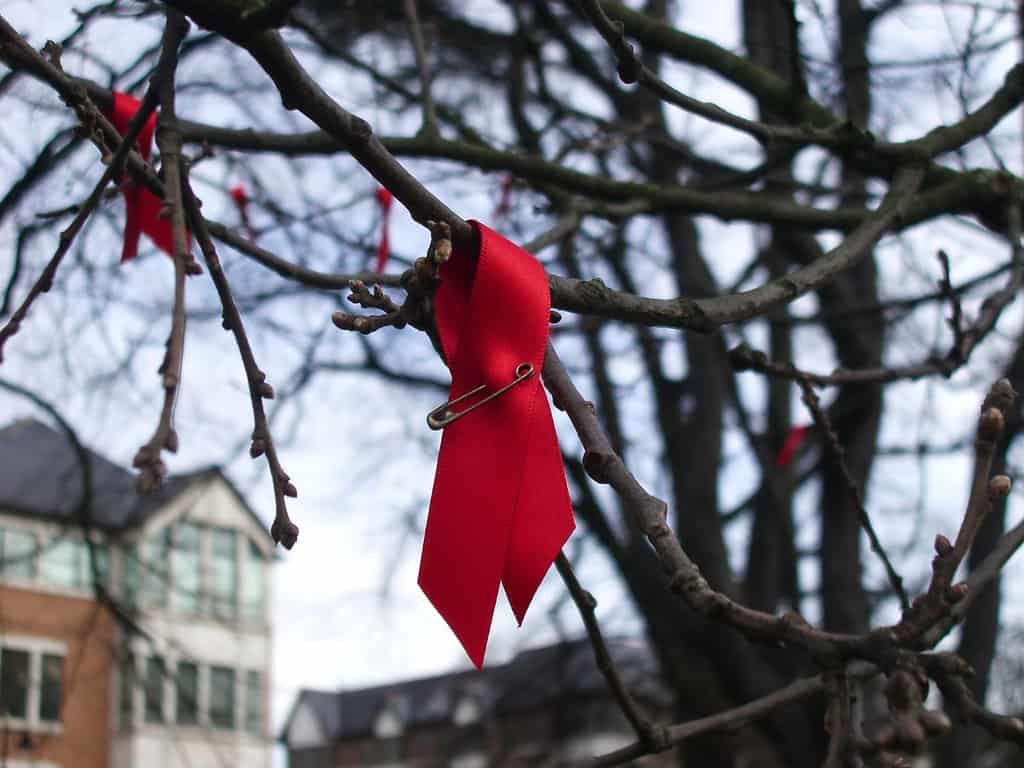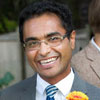I rarely have to think about what it must be like to be HIV+. Like many others, I grew up in a community where I knew no one who was HIV+ or had died from AIDS. My exposure was the RENT soundtrack. And seeing the film, I couldn’t really understand what the reality of seeing someone I love suffer from HIV/AIDS must be like. Then, after college, I met Mr. Johnson.
Mr. Johnson was a client of mine at the Bread for the City legal clinic I worked at in Washington, DC. He came to our clinic for help with a Social Security disability claim that had been denied. Mr. Johnson was chronically depressed, had a long-standing back injury, and could barely walk. And he was HIV+. Thankfully, HIV medication has come a long way. For Mr. Johnson, it was the other ailments he had to worry about. If he continues to take his medication each day, he’ll live a normal life, albeit with HIV.

“AIDS Quilt in Front of White House.” The AIDS Quilt in Washington, DC was created to memorialize persons who died of AIDS. The project began in the 1980s amidst White House stigmatization of persons who were HIV+. The photo is featured courtesy of Scott Chacon of the Flickr Creative Commons.
It’s true HIV medication has come a long way, but a cure is still needed. While doctors and researchers continue to search for a cure, many people continue to live with the effects of stigmatization for their HIV status. This stigmatization has ripple effects across our society starting with the demonizing of persons who are HIV+. Living with outdated ideas of how HIV is spread, some people still end a friendship when they learn the friend or family member has HIV. Many with HIV report higher levels of depression and isolation.
Consequently, others decide not to get tested because a confirmed HIV status would mean being classified as deviant, evil, sinful, and dirty. And this means that HIV could continue to spread. As the disease spreads, so does the stigma.
***
It’s perhaps a simple coincidence that World AIDS Day falls near to or during Advent each year. Advent, we know, is a time of praying with the deep longings in our heart for wholeness, community, and joy. It is about allowing ourselves to search for how God is about to bring something new into the world. And where the work of God has already been preparing the way.
When I was still living in New York last year, my parish announced an upcoming fundraiser to support persons who are HIV+. The speaker invited participants of the parish to get involved, saying that HIV/AIDS ministry has been a long tradition of the parish since the mid-1980s. At a time when the White House itself “turned a blind eye” to people dying of AIDS, further perpetuating stigma, this parish heard the deep cries stirring in the hearts of its community members and decided to take action. Their continued action calls us to examine in what ways people are stigmatized today – by us personally and by all institutions in our country.
A voice cries out in the wilderness: ready the way of the Lord. In moments of hope and encounter, our heart’s stirrings meet those of the stigmatized. And if we’re attentive, we see God’s signs of mercy and love prompting us to be present to our hearts’ greatest aches so that others’ hearts will ache no longer. There, we’ll see how God longs to encounter us all the same.
-//-
The cover photo is featured courtesy of ttfnrob of the Flickr Creative Commons.
The name “Mr. Johnson” is a pseudonym to protect client confidentiality.


